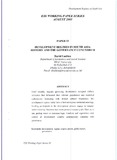| dc.contributor.author | Ludden, David | |
| dc.date.accessioned | 2010-10-06T03:27:55Z | |
| dc.date.available | 2010-10-06T03:27:55Z | |
| dc.date.copyright | 2005 | |
| dc.date.issued | 2005-08 | |
| dc.identifier.uri | http://hdl.handle.net/10361/345 | |
| dc.description | Cataloged from PDF version of report. | |
| dc.description | Includes bibliographical references at the end of page. | |
| dc.description.abstract | Until recently, regimes governing development occupied definite territories that delineated their relevant populations and identified authoritative leadership with distinct cultural boundaries. But development regimes today have at best ambiguous territorial moorings. Leading participants in the development process engage in rampant border crossing. Disparate institutions pursue disparate goals. There is no one guiding vision or dominant logic. Conflicts and negotiations over control of development underlie contemporary concerns with governance. | en_US |
| dc.description.statementofresponsibility | David Ludden | |
| dc.format.extent | 22 pages | |
| dc.language.iso | en | en_US |
| dc.publisher | BRAC University | en_US |
| dc.rights | BRAC University reports are protected by copyright. They may be viewed from this source for any purpose, but reproduction or distribution in any format is prohibited without written permission. | |
| dc.subject | Development | en_US |
| dc.subject | Regime | en_US |
| dc.subject | Empire | en_US |
| dc.subject | Nation | en_US |
| dc.subject | Globalization | en_US |
| dc.subject | Governance | en_US |
| dc.title | Development regimes in south Asia: History and the governance conundrum | en_US |
| dc.title.alternative | ESS working paper series August 2005: Paper 05 | |
| dc.type | Working paper series | en_US |
| dc.contributor.department | Department of Economics and Social Sciences, BRAC University | |

